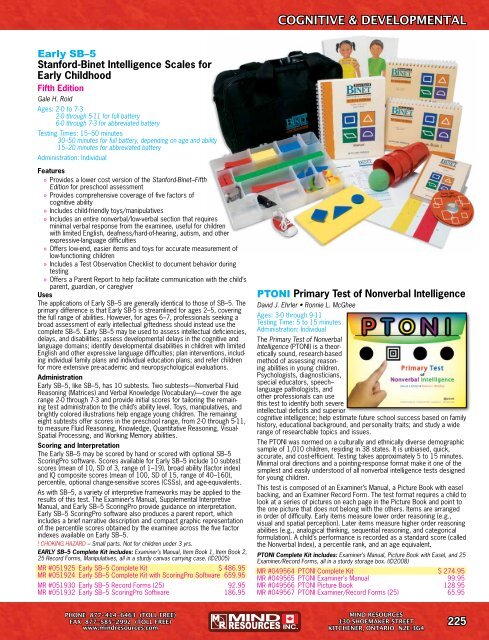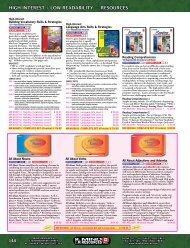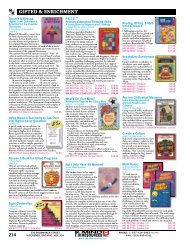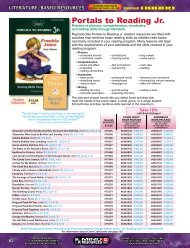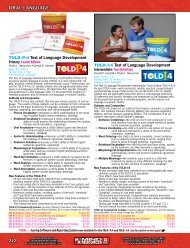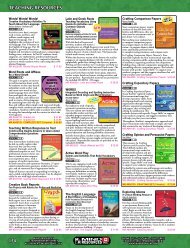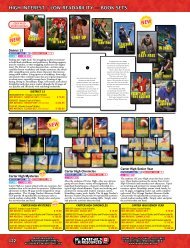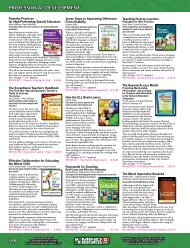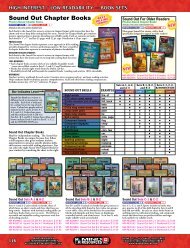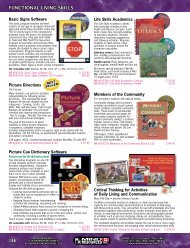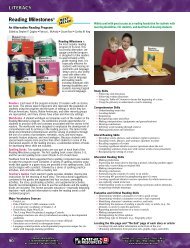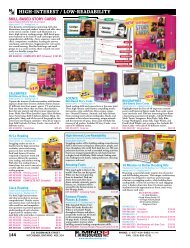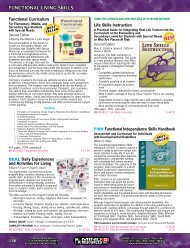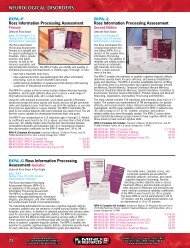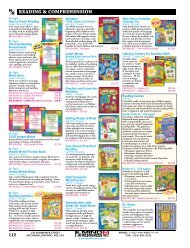COGNITIVE & DEVELOPMENTAL - Mind Resources
COGNITIVE & DEVELOPMENTAL - Mind Resources
COGNITIVE & DEVELOPMENTAL - Mind Resources
Create successful ePaper yourself
Turn your PDF publications into a flip-book with our unique Google optimized e-Paper software.
<strong>COGNITIVE</strong> & <strong>DEVELOPMENTAL</strong>Early SB–5Stanford-Binet Intelligence Scales forEarly ChildhoodFifth EditionGale H. RoidAges: 2-0 to 7-32-0 through 5-11 for full battery6-0 through 7-3 for abbreviated batteryTestingTimes: 15–50 minutes30–50 minutes for full battery, depending on age and ability15–20 minutes for abbreviated batteryAdministration: IndividualFeatures»»Provides a lower cost version of the Stanford-Binet–FifthEdition for preschool assessment»»Provides comprehensive coverage of five factors ofcognitive ability»»Includes child-friendly toys/manipulatives»»Includes an entire nonverbal/low-verbal section that requiresminimal verbal response from the examinee, useful for childrenwith limited English, deafness/hard-of-hearing, autism, and otherexpressive-language difficulties»»Offers low-end, easier items and toys for accurate measurement oflow-functioning children»»Includes a Test Observation Checklist to document behavior duringtesting»»Offers a Parent Report to help facilitate communication with the child’sparent, guardian, or caregiverUsesThe applications of Early SB–5 are generally identical to those of SB–5. Theprimary difference is that Early SB-5 is streamlined for ages 2–5, coveringthe full range of abilities. However, for ages 6–7, professionals seeking abroad assessment of early intellectual giftedness should instead use thecomplete SB–5. Early SB–5 may be used to assess intellectual deficiencies,delays, and disabilities; assess developmental delays in the cognitive andlanguage domains; identify developmental disabilities in children with limitedEnglish and other expressive language difficulties; plan interventions, includingindividual family plans and individual education plans; and refer childrenfor more extensive pre-academic and neuropsychological evaluations.AdministrationEarly SB–5, like SB–5, has 10 subtests. Two subtests—Nonverbal FluidReasoning (Matrices) and Verbal Knowledge (Vocabulary)—cover the agerange 2-0 through 7-3 and provide initial scores for tailoring the remainingtest administration to the child’s ability level. Toys, manipulatives, andbrightly colored illustrations help engage young children. The remainingeight subtests offer scores in the preschool range, from 2-0 through 5-11,to measure Fluid Reasoning, Knowledge, Quantitative Reasoning, Visual-Spatial Processing, and Working Memory abilities.Scoring and InterpretationThe Early SB–5 may be scored by hand or scored with optional SB–5ScoringPro software. Scores available for Early SB–5 include 10 subtestscores (mean of 10, SD of 3, range of 1–19), broad ability (factor index)and IQ composite scores (mean of 100, SD of 15, range of 40–160),percentile, optional change-sensitive scores (CSSs), and age-equivalents.As with SB–5, a variety of interpretive frameworks may be applied to theresults of this test. The Examiner’s Manual, Supplemental InterpretiveManual, and Early SB–5 ScoringPro provide guidance on interpretation.Early SB–5 ScoringPro software also produces a parent report, whichincludes a brief narrative description and compact graphic representationof the percentile scores obtained by the examinee across the five factorindexes available on Early SB–5.! CHOKING HAZARD – Small parts. Not for children under 3 yrs.EARLY SB–5 Complete Kit includes: Examiner’s Manual, Item Book 1, Item Book 2,25 Record Forms, Manipulatives, all in a sturdy canvas carrying case. (©2005)MR #051925 Early SB–5 Complete Kit $ 486.95MR #051924 Early SB–5 Complete Kit with ScoringPro Software 659.95MR #051930 Early SB–5 Record Forms (25) 92.95MR #051932 Early SB–5 ScoringPro Software 186.95PTONI Primary Test of Nonverbal IntelligenceDavid J. Ehrler • Ronnie L. McGheeAges: 3-0 through 9-11Testing Time: 5 to 15 minutesAdministration: IndividualThe Primary Test of NonverbalIntelligence (PTONI) is a theoreticallysound, research-basedmethod of assessing reasoningabilities in young children.Psychologists, diagnosticians,special educators, speech–language pathologists, andother professionals can usethis test to identify both severeintellectual deficits and superiorcognitive intelligence; help estimate future school success based on familyhistory, educational background, and personality traits; and study a widerange of researchable topics and issues.The PTONI was normed on a culturally and ethnically diverse demographicsample of 1,010 children, residing in 38 states. It is unbiased, quick,accurate, and cost-efficient. Testing takes approximately 5 to 15 minutes.Minimal oral directions and a pointing-response format make it one of thesimplest and easily understood of all nonverbal intelligence tests designedfor young children.This test is composed of an Examiner’s Manual, a Picture Book with easelbacking, and an Examiner Record Form. The test format requires a child tolook at a series of pictures on each page in the Picture Book and point tothe one picture that does not belong with the others. Items are arrangedin order of difficulty. Early items measure lower order reasoning (e.g.,visual and spatial perception). Later items measure higher order reasoningabilities (e.g., analogical thinking, sequential reasoning, and categoricalformulation). A child’s performance is recorded as a standard score (calledthe Nonverbal Index), a percentile rank, and an age equivalent.PTONI Complete Kit includes: Examiner’s Manual, Picture Book with Easel, and 25Examiner/Record Forms, all in a sturdy storage box. (©2008)MR #049564 PTONI Complete Kit $ 274.95MR #049565 PTONI Examiner’s Manual 99.95MR #049566 PTONI Picture Book 128.95MR #049567 PTONI Examiner/Record Forms (25) 65.95PHONE 877-414-6463 (TOLL FREE)FAX 877-585-2992 (TOLL FREE)www.mindresources.comMIND RESOURCES130 SHOEMAKER STREETKITCHENER, ONTARIO N2E 3G4225


